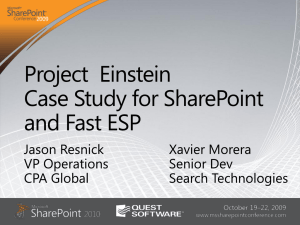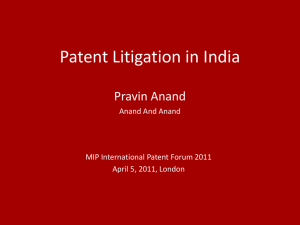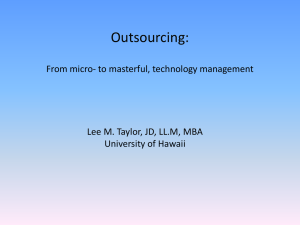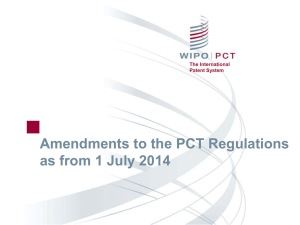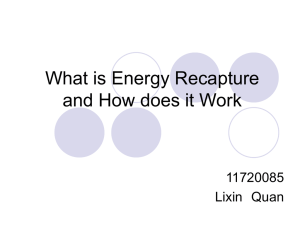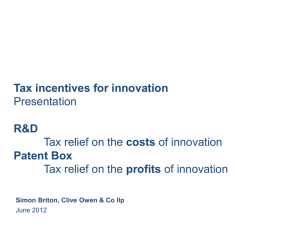Recent Case Law: Narrowing/Broadening Reissues
advertisement
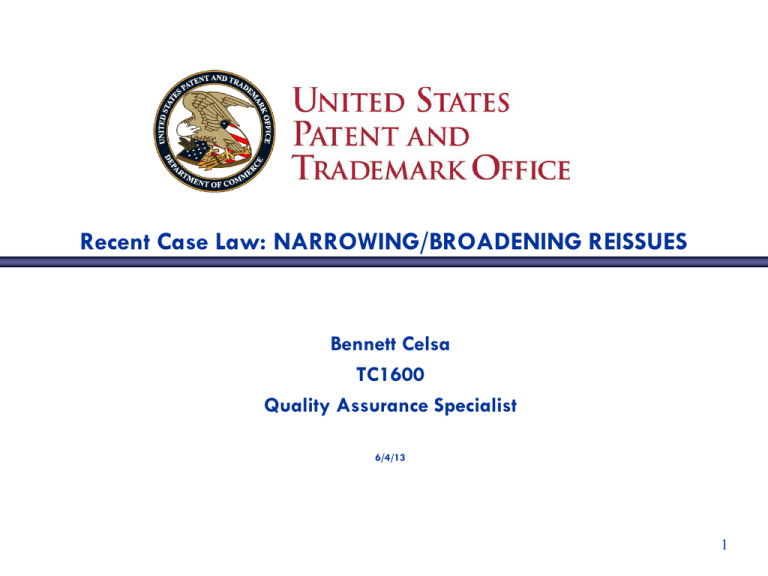
Recent Case Law: NARROWING/BROADENING REISSUES Bennett Celsa TC1600 Quality Assurance Specialist 6/4/13 1 Narrowing/Broadening Reissues: Index 1. Statutory Support: 35 U.S.C. § 251, ¶¶ 1 & 4; • Narrowing Reissue: In re Tanaka, 640 F3d 1246, 98 USPQ2d 1331 (Fed. Cir. 2011). • Broadening Reissue: - “Broadened Claim”; - “Unequivocal Intent”; - Bars (e.g. Recapture) In re Staats, 671 F3d 1350, 101 USPQ2d 1930 (Fed. Cir. 2012). 2 Recapture (MPEP 1412.02): Index • Recapture Case Law: o Applicability: a. b. o MBO Laboratories, Inc. v. Becton, Dickinson & Co., 474 F.3d 1323, 94 USPQ2d 1598 (Fed. Cir. Apr. 12, 2010); Ex parte JOERN-PETER HALLE, ANDREAS GOPPELT, and PETER HOF Appeal 2012-006124 Application 12/540,396. 3rd prong exception: Recapture (e.g. “partial recapture”): b. In re Mostafazadeh, 643 F3d 1353, 98 USPQ2d 1639 (Fed. Cir. 2011); In re Youman, 679 F3d 1335, 102 USPQ2d 1862 (Fed. Cir. 2012). o Recapture Examples 1-4. a. 3 35 U.S.C. 251 ¶ ¶ 1&4 : Narrowing/Broadening Reissue 35 U.S.C. 251 Reissue of defective patents. Whenever any patent is, through error without any deceptive intention, deemed wholly or partly inoperative or invalid, by reason of a defective specification or drawing, or by reason of the patentee claiming more or less than he had a right to claim in the patent, the Director shall, on the surrender of such patent and the payment of the fee required by law, for reissue the patent for the invention disclosed in the original patent, and in accordance with a new and amended application, for the unexpired part of the term of the original patent.No new matter shall be introduced into the application for reissue. The Director may issue several reissued patents for distinct and separate parts of the thing patented, upon demand of the applicant, and upon payment of the required fee for a reissue for each of such reissued patents. The provisions of this title relating to applications for patent shall be applicable to applications for reissue of a patent, except that application for reissue may be made and sworn to by the assignee of the entire interest if the application does not seek to enlarge the scope of the claims of the original patent. No reissued patent shall be granted enlarging the scope of the claims of the original patent unless applied for within two years from the grant of the original patent. (Amended Nov. 29, 1999, Public Law 106-113, sec. 1000(a)(9), 113 Stat. 1501A-582 (S. 1948 sec. 4732(a)(10)(A)).) 4 MPEP 1414: Content of Reissue Oath/Declaration (“Intent To Broaden/Narrow”) Reissue oath/declaration/substitute statement must contain the following: - (A) A statement that the applicant believes the original patent to be wholly or partly inoperative or invalid — (1) by reason of a defective specification or drawing, or (2) by reason of the patentee claiming more or less than patentee had the right to claim in the patent; - (B) A statement of at least one error which is relied upon to support the reissue application, i.e., the basis for the reissue. See also 37 CFR 1.175 (a)(1). 5 Reissue Oath/Dec or Substitute Statement • Below is the Form PTO/AIA/05 (06-12) language in an inventor declaration): ________________________________________________ See: www.uspto.gov/forms/index.jsp) for Pre- and Post- AIA Reissue Forms (critical date: 9/16/12) 6 Narrowing Reissues 7 Tanaka (BPAI) • Tanaka reissue: added dependent claims; but retained patented claims. • BPAI (expanded 7 judge panel): affirmed examiner’s 35 U.S.C. § 251 rejection- addition of “narrower claims” without narrowing or cancelling patented independent claims is not a reissuable error (hedging/bullet claims). 8 In re Tanaka (CAFC) • In re Tanaka, 98 USPQ2d 1331 (Fed. Cir. 2011): Federal Circuit reversed the Board- a new dependent claim can be the basis of a reissue application under 35 U.S.C. §251. RATIONALE: new dependent claims are separate inventions: • distinct scope (narrower) and • purpose (invalidity hedge) e.g. claim interpretation under the doctrine of “claim differentiation”: can clarify an independent claim that otherwise might be found invalid. • Thus, adding new dependent claim(s) can correct an error in that the disclosed invention is not protected to the fullest extent allowed by law, which renders the original patent at least partially inoperative and/or invalid. 9 Broadening 10 MPEP 1412.03: “Broadened Reissue Claim” Definition: A claim which enlarges the scope of the claims of the patent, i.e., a claim which is greater in scope than each and every claim of the original patent A reissue claim enlarges the scope of the patented claims if it is broader in at least one respect, even though it may be narrower in other respects. Tip: Compare reissue claims to broadest patented claims. 11 Infringement Test Infringement Test: A claim is broadened if the patent owner would be able to sue any party for infringement who previously could not have been sued for infringement Example: where the original patent claims only a process of making, and the reissue application newly adds a product claim, the scope has been broadened because a party could not necessarily be sued for infringement of the product based on the claims of the original patent if it were made by a different process. 12 MPEP 1412.03 II: Broadening Scope of Patented “Dependent Claims” General Rule: broadening the scope of patented dependent claims is NOT BROADENING Example: where dependent patented claim 2 is broadened via the reissue, but independent claim 1 on which it is based is not broadened. Rationale: A proper dependent claim is construed to contain all the limitations of the claim upon which it depends, thus claim 2 must be at least as narrow as claim 1. 13 MPEP 1412.03 III. NEW CATEGORY OF INVENTION ADDED IN REISSUE - GENERALLY IS BROADENING Adding process claims as a new category of invention to be claimed in the patent (i.e., where there were no method claims present in the original patent) is generally considered as being a broadening of the invention. See Ex parte Wikdahl, 10 USPQ2d 1546 (Bd. Pat. App. & Inter. 1989). Exception: reissue claims use product A claimed in the original patent claims. Example: (1) a process of using the product A (made by the process of the original patent) to make a product B, disclosed but not claimed in the original patent; or (2) a process of using the product A to carry out a process B disclosed but not claimed in the original patent. Although this amendment of the claims adds a method of making product B or adds a method of using product A, this is not broadening because the "newly claimed invention" contains all the limitations of the original patent claim(s). 14 MPEP 1412.03 IV. WHEN A BROADENED CLAIM CAN BE PRESENTED A broadened claim can be presented within two years from the grant of the original patent in a reissue application. See 35 U.S.C. 251 ¶ 4; A reissue application filed on the 2-year anniversary date from the patent grant is considered to be filed within 2 years of the patent grant. 15 BROADENED CLAIM: “unequivocal intent” to broaden A broadened claim can be presented after two years from the grant of the original patent in a broadening reissue application which was filed within two years from the grant where any intent to broaden is “unequivocally” indicated in the reissue application within the two years from the patent grant. See MPEP 1412.03 IV. A statement that "the patent is wholly or partly inoperative by reason of claiming more or less than applicant had a right to claim“ (without more) is NOT an unequivocal statement of an intent to broaden. 16 BROADENED CLAIM: SUBMITTED AFTER TWO YEARS Thus, a broadened claim may be presented in a reissue application after the two years, even though the broadened claim presented after the two years is different than the broadened claim presented within the two years. Finally, if intent to broaden is indicated in a parent reissue application within the two years, a broadened claim can be presented in a continuing (continuation or divisional) reissue application after the two year period. See MPEP1451. In any other situation, a broadened claim cannot be presented. 17 In re Staats Federal Circuit holds that consistent with In re Doll, 419 F.2d 925, 82 USPQ 188 (C.C.P.A. 1970), and 35 U.S.C. § 251 an intent to broaden within the two year period will permit the filing of a continuation application that broadens beyond the statutory two-year period, even when the continuation claims are broadened, in a manner unrelated to any broadening aspect identified within the two-year period. In re Staats, 671 F3d 1350 at 1352-54, 101 USPQ2d 1930 at 1932-34 (Fed. Cir. 2012). Tip: Establishing “intent to broaden” within two years of issuance permits later unrelated broadening of disclosed, but unclaimed embodiments. 18 Bars To Obtaining Broadening Reissues 1. Bars To Obtaining Broadening Reissues: a. New Matter and Restriction/Election bar (35 USC 251; MPEP 1412.01); a. Two Year bar (35 USC 251; MPEP 1412.03); b. Recapture bar (MPEP 1412.02). 19 Recapture is not an “error”correctable by reissue • Medtronic, Inc. v. Guidant Corp., 465 F.3d 1360, 1372-73; 80 USPQ2d 1558,1566 (Fed.Cir.2006) “[T]he deliberate surrender of a claim to certain subject matter during the original prosecution of the application for a patent ‘made in an effort to overcome a prior art rejection’ is not such ‘error’ as will allow the filing of a reissue application” A reissue will not be granted to "recapture" claimed subject matter surrendered in an application to obtain the original patent. 20 MPEP 1412.02 IV: Recapture Rejection ¶ 14.17 Rejection, 35 U.S.C. 251, Recapture Claim[ 1 ] rejected under 35 U.S.C. 251 as being an improper recapture of broadened claimed subject matter surrendered in the application for the patent upon which the present reissue is based. See Pannu v. Storz Instruments Inc., 258 F.3d 1366, 59 USPQ2d 1597 (Fed. Cir. 2001); Hester Industries, Inc. v. Stein, Inc., 142 F.3d 1472, 46 USPQ2d 1641 (Fed. Cir. 1998); In re Clement, 131 F.3d 1464, 45 USPQ2d 1161 (Fed. Cir. 1997); Ball Corp. v. United States, 729 F.2d 1429, 1436, 221 USPQ 289, 295 (Fed. Cir. 1984). A broadening aspect is present in the reissue which was not present in the application for patent. The record of the application for the patent shows that the broadening aspect (in the reissue) relates to claim subject matter that applicant previously surrendered during the prosecution of the application. Accordingly, the narrow scope of the claims in the patent was not an error within the meaning of 35 U.S.C. 251, and the broader scope of claim subject matter surrendered in the application for the patent cannot be recaptured by the filing of the present reissue application. 21 Scope of Recapture 1. Not limited to patented application: • Reissue recapture applies to related family member applications. See MBO Laboratories, Inc. v. Becton, Dickinson & Co., 474 F.3d 1323, 94 USPQ2d 1598 at 1606 (Fed. Cir. Apr. 12, 2010) (a more limited recapture rule would undercut “the rule against recapture’s public-reliance rationale” and a patent family’s entire prosecution history should be reviewed “when applying both the rule against recapture and prosecution history estoppel.” 2. Not limited to arguments/amendment resulting from prior art rejections: • Enablement and indefinite rejections can raise recapture. See Ex parte JOERN-PETER HALLE, ANDREAS GOPPELT, and PETER HOF Appeal 2012-006124 Application 12/540,396. 22 MPEP 1412.02: Recapture of Canceled Subject Matter: 3 Part Test THREE STEP TEST: (1) Whether, and in what respect, the reissue claims are broader in scope than the original patent claims; (2) Whether the broader aspects of the reissue claims relate to subject matter surrendered in the original prosecution; and (3) Whether the reissue claims were materially narrowed in other respects, so that the claims may not have been enlarged, and hence avoid the recapture rule. North American Container, 415 F.3d 1335,1349; 75 USPQ2d 1545,1556 (Fed. Cir. 2005). 23 Recapture: 1st Step A. The First Step - Was There Broadening? • • Compare reissue claim scope with scope of patented claims A reissue claim is broadened where some limitation of the patent claims is no longer required in the reissue claim • see MPEP § 1412.03 previously discussed If the reissue claim is not broadened in any respect as compared to the patent claims, the analysis ends; there is no recapture. 24 Recapture: 1st step (cancelled claims) Comparing Reissue Claims with Canceled Claims: "Canceled claims“: claims canceled from the original application to obtain the patent for which reissue is now being sought: (A) can simply be canceled and not replaced by others, or can be canceled and replaced by other claims which are more specific than the canceled claims in at least one aspect to thereby define over the art of record. (B) 25 Recapture: 1st step (cancelled claims) The recapture rule bars the patentee from acquiring, through reissue, claims that are in all aspects of the same scope as, or (B) broader in scope than, those claims canceled from the original application to obtain a patent. (A) See: Ball Corp. v. United States, 729 F.2d 1429 at 1436, 221 USPQ 289 at 295 (Fed. Cir. 1984). 26 Recapture: 1st Step Summary • a. b. Where the reissue claims: are narrower than the claims of the original patent in all aspects OR are equal in scope to the patent claims, there is no recapture as to those reissue claims. Where, reissue claims are: a. broader in at least one respect; OR b. both broadened and narrowed compared with the patent claims the nature of the broadening and narrowing must be examined to determine whether the reissue claims are barred as being recapture of surrendered subject matter. • 27 Recapture: 2nd step B. Second Step - determine whether the broader aspects of the reissue claims relate to subject matter surrendered in the original prosecution. “Surrender-generating limitation” – The “limitation” presented, argued, or stated to make the claims patentable (e.g. over the art in the application) “generates” the surrender of claimed subject matter. 28 Recapture: 1st and 2nd Step Summary A reissue claim Avoids recapture: by retaining the full scope of the “surrendergenerating limitation”; a. b. Triggers recapture: -by omitting the “surrender-generating limitation” or -by broadening the “surrender-generating limitation” unless the reissue claims were materially narrowed in other respects, so as to avoid the recapture rule (3rd step exception). 29 Recapture: 3rd Step C. The Third Step - Were the reissue claims materially narrowed in other respects, so as to avoid the recapture rule? CAFC recently addressed avoiding recapture by materially narrowing in other respects stating: “… the recapture rule is violated when a limitation added during prosecution is eliminated entirely, even if other narrowing limitations are added to the claim.“ “If the added limitation is modified but not eliminated, the claims must be materially narrowed relative to the surrendered subject matter such that the surrendered subject matter is not entirely or substantially recaptured.” (with emphasis) In re Mostafazadeh, 643 F3d 1353 at 1358, 98 USPQ2d 1639 at 1644. 30 In re Mostafazadeh: 3rd Step Exception Must distinguish among: I. II. III. Patented Claims; Reissue Claims (claims undergoing examination in reissue); and Original (Pre-Surrender) Claims The exception applies to Reissue Claims: • Broader than the patented claims in a surrendered aspect; but “Materially Narrower” relative to the original claims. • 31 In re Mostafazadeh: 3rd Step Exception “Materially Narrower”: a broadened reissue claim that: • avoids full or substantial recapture of subject matter surrendered during prosecution i.e. the surrendered subject matter has NOT crept into the reissue claim. Narrowing limitation must be: • related to the surrendered subject matter; and be material e.g. avoid recapture by distinguishing over prior art. • See: In re Mostafazadeh, 643 F3d 1353 at 1358, 98 USPQ2d 1639 at 1644 (“attachment pad” limitation, although narrowing and related, not material; and other added limitations, although narrowing, were unrelated). 32 In re Youman 1. Original Claim: An electronic TV programming guide … displaying a plurality of television program titles alphabetically … selection means for allowing said user to select a title for display on said television receiver by selecting the first n characters of said title ..; Obvious to modify TV program guide in view of Reed’s computer alphanumeric keyboard selection of a multimedia search system of alphabetic title lists. 2. Patent Claim: … selection means comprising means for causing each of said n characters to cycle forward and backward through a plurality of alphanumeric characters 3. Reissue Claim: using a wireless remote control with non-alphanumeric keys for selecting alphabetic TV program titles. 33 In re Youman cont. • • Step 1: Reissue claim is narrower than the original claim but broader than the patent claim. Step 2: “determine whether the broader aspects of the reissue claims relate to surrendered subject matter.” Held: “we look to changes in the claim language and arguments in the prosecution history that were made in an effort to overcome prior art to determine what subject matter the patentee surrendered”. Here: amending “selecting means” to require “cycling to select characters” to input 36 different characters(A-Z;0-9) using only a few keys on the remote control device. Surrendered subject matter: any selecting means that was broader than the cycling limitation of the patented claim. Youman at 1867-8. 34 In re Youman cont. Step 3: … Unless the claims are materially narrowed in a way that avoids substantial or whole recapture of the surrendered subject matter, the surrendered subject matter has crept into the reissue claims and they are barred under the recapture rule. Mostafazadeh, 643 F.3d at 361. Analysis: • the added limitation -cycling- has not been eliminated; rather, it has been broadened to -changing- (i.e. modified limitation); • “materially narrows”: • use the originally presented claim as a frame of reference; • where the modified limitation was contained in the prior art, as the attachment pad was, the limitation is not materially narrowing. Mostafazadeh, 643 F.3d. at 1361 & n.4. • 35 In re Youman cont. • If the modified limitation does not materially narrow (or, in other cases, the limitation is eliminated), the Board must still determine whether the reissued claims were materially narrowed in other respects so that the claims have not been enlarged, and hence avoid the recapture rule. e.g. Mostafazadeh, 643 F.3d at 1361 (applying this analysis where limitation modified but not materially narrowing …) . See: Youman at 1870-71. • Judge Lourie dissent: proper frame of reference for 3rd prong should be patent claim; which should limit “modified” reissue claims. • Board remand to apply the proper standard (See Ex parte Roger Youman and Morris: 09/313,532 decided April 9, 2013.) 36 In re Youman As pointed out by the Federal Circuit in Youman: “ … Mostafazadeh establishes, as a ceiling for determining whether a modified limitation materially narrows, any recapture of surrendered subject matter that was in the prior art of the original prosecution. The logic of such a ceiling flows from the concept of “error” under the reissue statute. When a patentee is narrowing its claim limitations due to prior art that would otherwise render the claims unpatentable, the patentee can only be doing so deliberately, without any possibility of error. Thus, if the patentee modifies the added limitation such that it is broader than the patented claim yet still materially narrows relative to the original claim, the recapture rule does not bar reissue. “ 37 Recapture: 3rd Step Summary Third Prong of Three Step Test for Recapture-Reissue “Whether the reissue claims were materially narrowed in other respects, so that the claims may not have been enlarged, and hence avoid the recapture rule” The reissue applicant may rebut a recapture rejection by demonstrating that a reissue claim is “materially narrowed” in other respects relative to the surrendered subject matter (compared to the original pre-surrender claims) such that the surrendered subject matter is not entirely or substantially recaptured. 38 Example 1 Application claim to AB was amended in response to an art rejection to add C to obtain issued claim ABC ( i.e. ABABC ; C is the surrender-generating limitation) Reissue claim to ABbroadenedC: No recapture because: 1. it is narrower in scope than canceled claim AB and *2. it retains the surrender-generating limitation C 39 Example 2 Application claim to ABZ was amended in response to an art rejection to add element C to obtain issued claim ABZC (i.e. ABZABZC ; C is the “surrender generating limitation”) Reissue claim ABC (i.e., element Z is deleted): No recapture because: 1. ABC is narrower in scope as compared to cancelled ABZ in respect to the addition of C; and *2. It retains the surrender-generating limitation C. 40 Example 3 Patent claimed ABC : where element C was either a limitation added to AB to obtain allowance of the original patent, or was argued by applicant to define over the art (or both) (i.e. ABABC or unamended ABC (C argued); C is the “surrender generating limitation”) Reissue: claim ABD (D is unrelated to C) Recapture triggered because it completely omits the “surrender generating limitation” C Note: even though the reissue claim is narrower than patent claim ABC by the addition of D, adding D (which is unrelated to the surrendered subject matter) does not save the claim from recapture. 41 Example 4 Original application claimed a method of making a glass lens, where the ion implantation step used a molten bath to diffuse ions into the lens. The molten bath diffusion step was amended to recite a pressure of 50-60 PSI and temperature between 150-200 degrees C - to define over the art. Reissue claim was drawn to a method of making a glass lens using a plasma stream* (rather than a molten bath) to diffuse ions into the lens without reciting pressure and temperature. *Note : plasma stream was not claimed in the patented application and there was no restriction. 42 Example 4: Cont. NO RECAPTURE: 2nd prong exception to recapture: i. applicant’s failure to claim a disclosed embodiment to plasma ion implantation (i.e., the “overlooked aspect” of using a plasma stream rather than a molten bath to provide the ions), was a proper 35 U.S.C. 251 error, which can be corrected by reissue; and ii. the overlooked unclaimed aspect is wholly unrelated to the surrendered subject matter and thus the recapture rule is not triggered (2nd step not satisfied). See In re Mostafazadeh, 643 F3d 1353 at 1357-58, 98 USPQ2d 1639 at 1643-44. 43 Questions Bennett Celsa (QAS) bennett.celsa@uspto.gov (571) 272-0807 Technology Center 1600 USPTO 44

